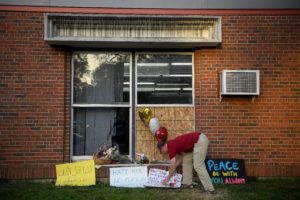Hate crimes are on the rise in America, and religion-based violence leads the pack.
As a May Senate Judiciary Committee hearing led by Sen. Chuck Grassley thoroughly detailed: Hate crimes against minority faiths spiked 86 percent in the past year — a low-ball percentage that only reflects what’s reported.
“Religious hate crimes against Muslims are the fastest growing category,” said Grassley, an Iowa Republican.
“Fear for practicing one’s religion should never happen in this country.”
Religion-based violence touched the Midwest again last weekend when a bomb exploded inside the Dar Al-Farooq Islamic Center in suburban Minneapolis. As people gathered for morning prayers, the explosion ripped through the local religious leader’s office. Furnishings were charred, windows shattered — but thankfully no lives lost.
Only a week before, swastikas and messages warning “leave, you R Dead” were scrawled in a nearby cemetery — the state’s first devoted to members of the Islamic faith.

“The morning of that bombing, people had come to pray,” said Charles Crawley, president of the Inter-Religious Council of Linn County. “They came to practice their faith.”
Crawley said his first thoughts were of the vibrant Muslim community in Cedar Rapids, and the 16th Street Baptist Church bombing in Birmingham in 1963 that horrifically ended the lives of four young black girls and served as a catalyst for national civil rights advances.
The Linn County council is currently comprised of nine faith groups — Baha’i, Buddhism, Christianity, Hinduism, Judaism, Muslim, Native American, Secular Humanism and Unitarian Universalism — and has a mission “to promote understanding, compassion, and acceptance of each other and our beliefs.” Since its formation in 1993, the group has focused on education and hosted numerous unity events.
“Our whole purpose for existing is to try to prevent the type of thing that’s happened in Minnesota,” Crawley said. “And, short of that, we must respond to it.”
The executive board agreed to send $100 to Al-Farooq to help with clean up and repair, but they wanted to do more — something that expressed compassion to those victimized and offered an opportunity for locals to stand in solidarity against hate. “What we came up with is Postcards for Peace,” Crawley explained. “People only need to come and write a message of support. We’ll provide the postcards, pens and postage.”
Gather at Via Sofia’s, 1125 1st Ave SE in Cedar Rapids, Tuesday from 7 to 9 a.m., 11 a.m. to 1 p.m., or 5 to 7 p.m.
“In this way, we hope to show … that there are people who believe in love and justice and who will not tolerate acts of violence toward minorities and people of a different faith.”
Cornell College’s Office of Chaplain and Spiritual Life, which is a part of the Linn County council, will hold a sister event for people in the Mount Vernon area. Their “Postcards for Peace” event is 8 a.m. to 8 p.m. Tuesday on the third floor of the Cole Library.
These are opportunities to stand with your neighbors in defiance of violence; opportunities to begin to turn the statistical tide of hate.
This column by Lynda Waddington originally published in The Gazette on August 12, 2017. Photo credit: Aaron Lavinsky/Minneapolis Star Tribune/TNS
